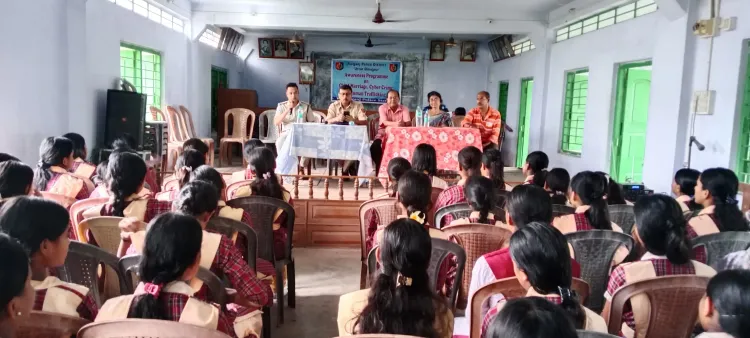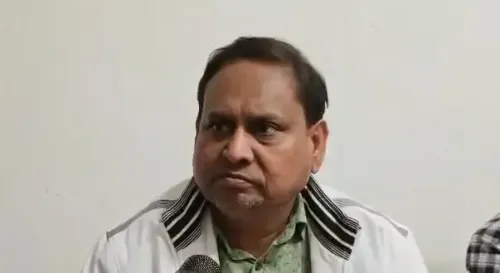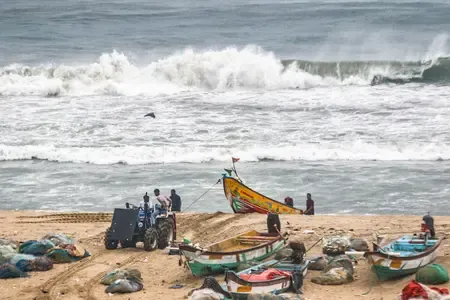How Is Rajasthan Transforming Law Enforcement Into a Citizen-Centric Model?

Synopsis
Key Takeaways
- Rajasthan is transforming law enforcement with community involvement.
- Over 300,000 volunteers play vital roles in policing.
- Women volunteers are crucial in supporting victims.
- Swagat Kaksh foster a welcoming atmosphere for complaints.
- The initiative aims to reshape public perceptions of police.
Jaipur, July 23 (NationPress) In a significant shift from the colonial-era approach characterized by intimidation and coercion, Rajasthan is embracing a transformative model of law enforcement that prioritizes citizens through an extensive community policing initiative.
With more than three lakh volunteers, including Suraksha Sakhis, Police Mitras, CLG members, and student cadets, the state is promoting direct public interaction to cultivate trust, enhance safety, and humanize the police's role.
This transition represents a major advancement in reshaping the police from mere enforcers to valued community allies, redefining public perceptions and restoring faith in law and order, stated Pankaj Choudhary, IPS, SP & Nodal Officer, Community Policing Rajasthan.
Historically, police officers used fear tactics to maintain order during the colonial period; however, the objective now is to transform how the police are viewed. Community policing in Rajasthan is pivotal in closing the divide between law enforcement and the community, thanks to these 300,000 registered volunteers, added Chaudhary.
In an interview with IANS, Chaudhary shared that Rajasthan is inspired by progressive policing models from southern states like Kerala.
“During our visit in 2023 to a police station in Kerala, we were impressed by their self-sufficiency, with ambulances and Thar jeeps available at the station level. They do not rely on external emergency services, unlike us, who depend on hospitals for ambulances during emergencies. Adopting a similar model can significantly enhance our response capabilities,” he remarked.
He acknowledged that Kerala excels in infrastructure and community engagement. However, Rajasthan has made notable strides in recent years with its people-centric policing initiatives. The community policing framework in Rajasthan includes approximately 37,000 Suraksha Sakhis.
These women volunteers, particularly from rural areas, serve as critical links between victims and the police, especially in matters of domestic violence, harassment, and substance abuse. They advocate for victims who might hesitate to approach law enforcement directly.
Additionally, the Police Mitras group contains around 40,000 volunteers who assist in managing traffic, ensuring crowd safety during events, and responding to accidents. They often document incidents and aid in transporting victims to medical facilities.
“We also have Community Liaison Groups (CLG) comprising 98,000 members dedicated to fostering public trust in the police. There are also 35,000 Gram Rakshaks and student cadets who contribute to grassroots awareness and community support initiatives,” he added.
“We've set up Swagat Kaksh (Reception Rooms) at police stations, where officers are trained to empathetically listen to victims and counsel them in a supportive environment when they come to file complaints. This shift towards empathy is positively influencing public perceptions of law enforcement,” Choudhary noted.
“Our aim is to shift away from the colonial-era perception of police as enforcers associated with fear and punishment, towards a service-oriented, citizen-friendly force. Countries abroad and progressive states in southern India have achieved this to a large extent; now, we aim to foster the same level of trust and dialogue here,” he asserted.
He further mentioned that students are encouraged to visit police stations.
“In Hanumangarh, students recently engaged with the SP and returned with a positive impression. Sharing their experiences helps improve the police's image within the community,” he added.
He emphasized that such paradigm shifts are being recognized and rewarded. “Some of our team members were referred to as ‘Devdoot’ (angels) during flood rescue operations by the SDRF. We believe that community policing deserves acknowledgment and appreciation,” Chaudhary underscored.
In a meeting with the DPRD (Department of Panchayati Raj and Development), it was proposed that police stations regularly host students to build relationships and foster trust in the system.
“We are committed to aligning with global standards and the practices of progressive Indian states to develop a policing model grounded in trust and dialogue,” he concluded.










